人教新目标(Go for it)版七年级下册Unit 4 Don't eat in class. Section A Grammar Focus~3c课件(共28张PPT)
文档属性
| 名称 | 人教新目标(Go for it)版七年级下册Unit 4 Don't eat in class. Section A Grammar Focus~3c课件(共28张PPT) |
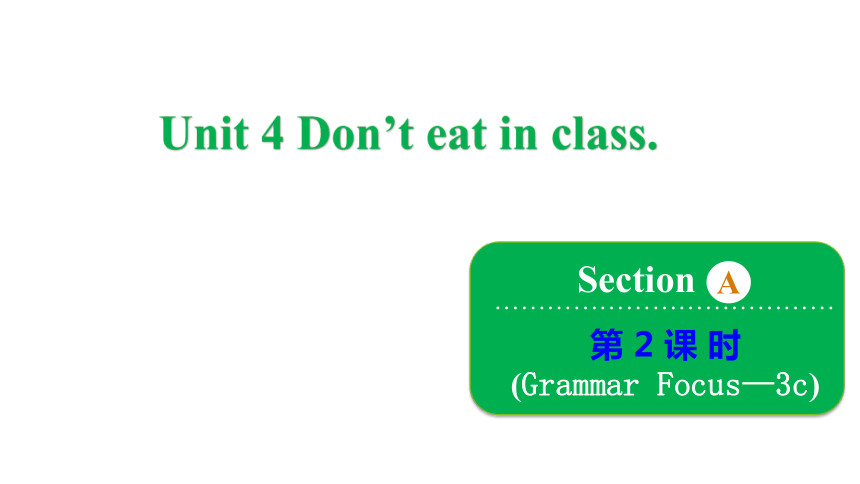
|
|
| 格式 | pptx | ||
| 文件大小 | 797.1KB | ||
| 资源类型 | 教案 | ||
| 版本资源 | 人教新目标(Go for it)版 | ||
| 科目 | 英语 | ||
| 更新时间 | 2024-05-02 00:00:00 | ||
图片预览

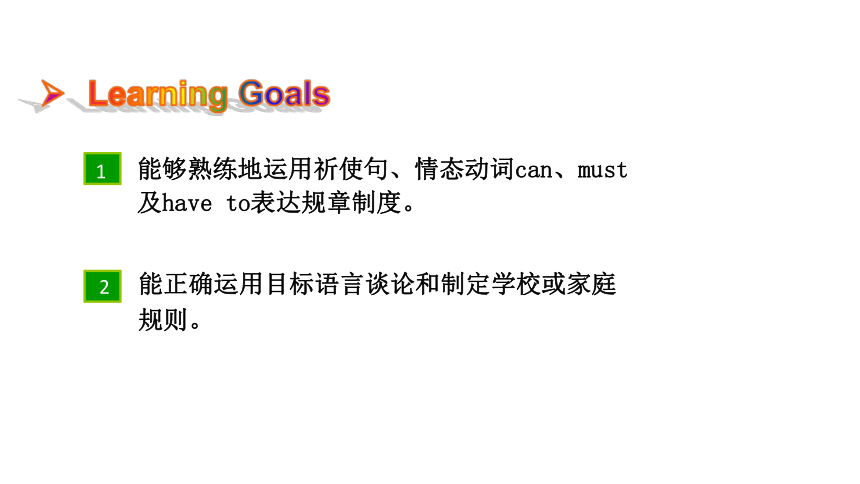

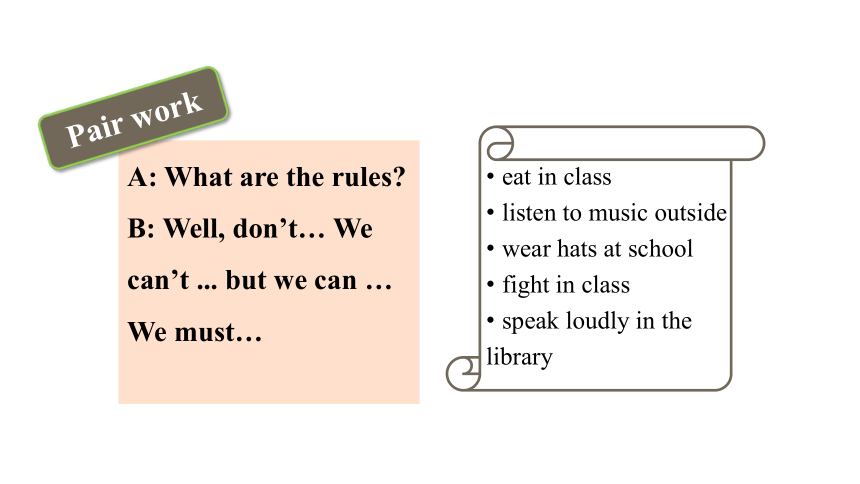
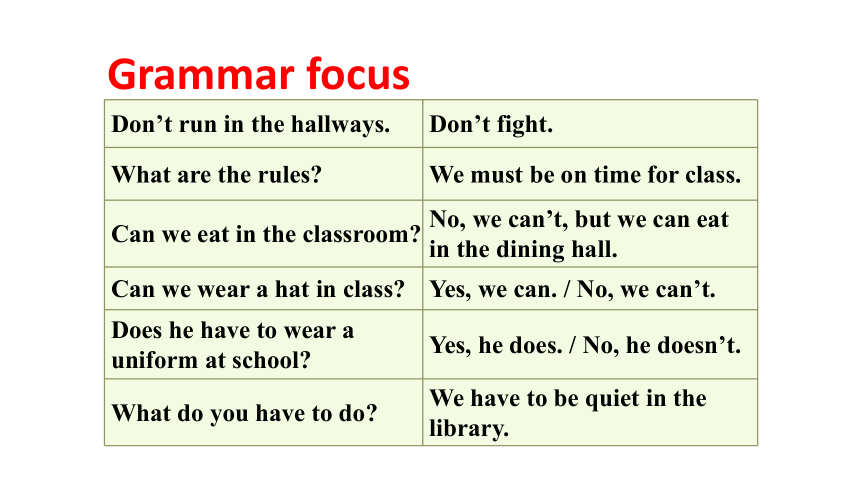
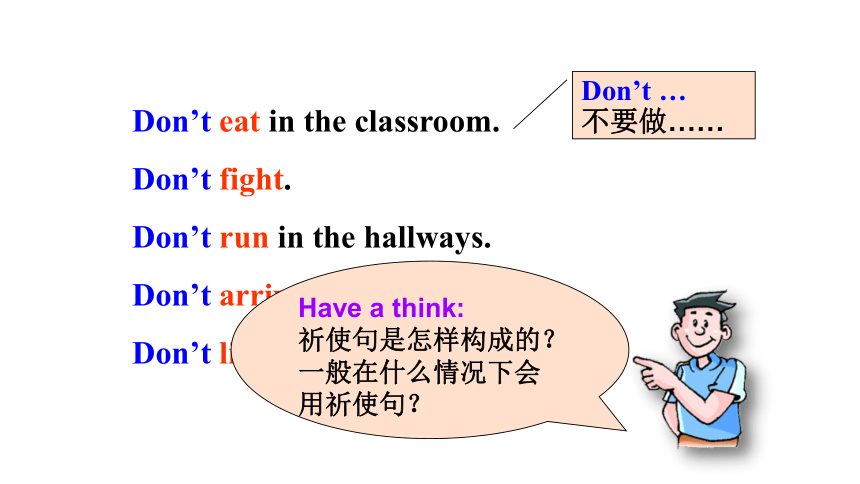
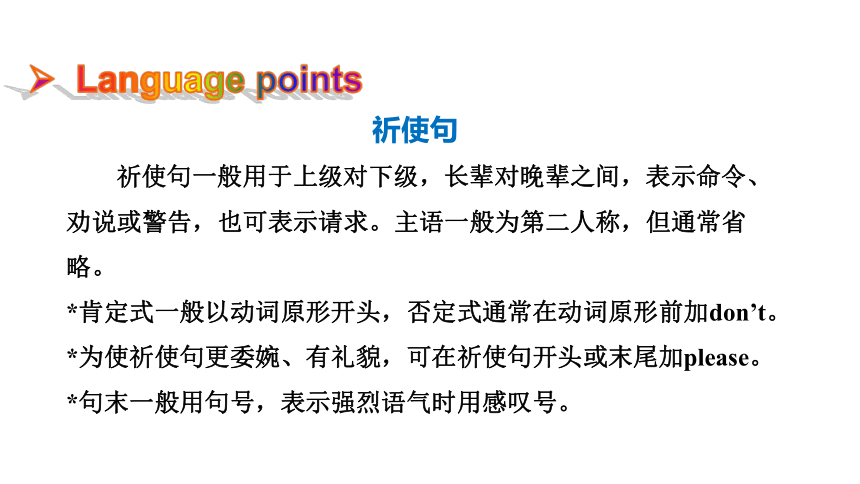
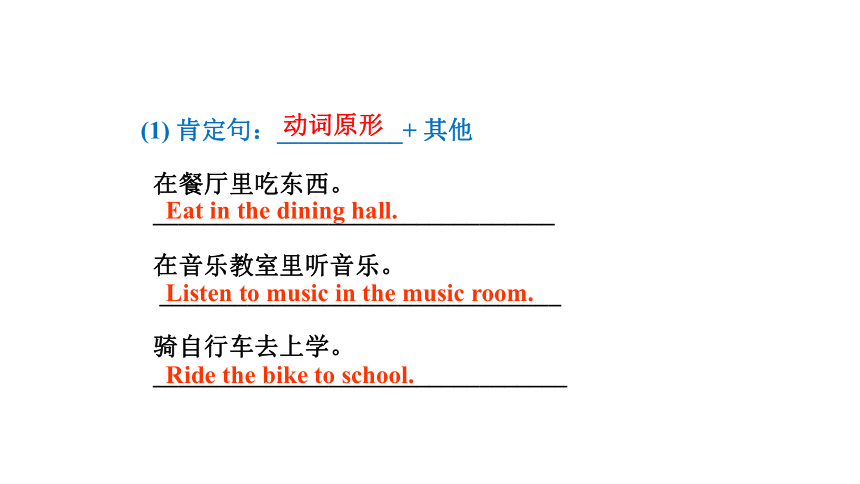
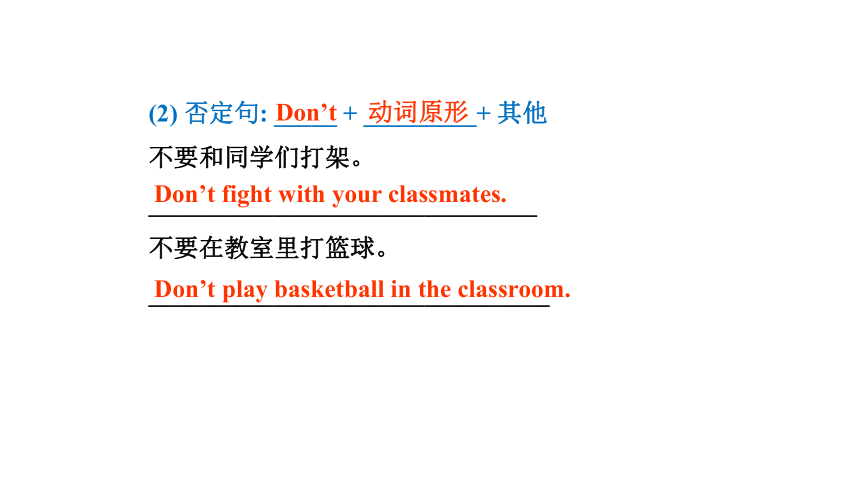
文档简介
(共28张PPT)
Section
第 2 课 时
(Grammar Focus—3c)
…………………………………
A
Unit 4 Don’t eat in class.
能够熟练地运用祈使句、情态动词can、must及have to表达规章制度。
1
能正确运用目标语言谈论和制定学校或家庭规则。
2
Learning Goals
What can/can’t you do at school or in the classroom
Think about it!
Warming-up
A: What are the rules
B: Well, don’t… We can’t ... but we can … We must…
eat in class
listen to music outside
wear hats at school
fight in class
speak loudly in the
library
Pair work
Don’t run in the hallways. Don’t fight.
What are the rules We must be on time for class.
Can we eat in the classroom No, we can’t, but we can eat in the dining hall.
Can we wear a hat in class Yes, we can. / No, we can’t.
Does he have to wear a uniform at school Yes, he does. / No, he doesn’t.
What do you have to do We have to be quiet in the library.
Grammar focus
Don’t eat in the classroom.
Don’t fight.
Don’t run in the hallways.
Don’t arrive late for class.
Don’t listen to music in class.
Have a think:
祈使句是怎样构成的?一般在什么情况下会用祈使句?
Don’t …
不要做……
祈使句
祈使句一般用于上级对下级,长辈对晚辈之间,表示命令、劝说或警告,也可表示请求。主语一般为第二人称,但通常省略。
*肯定式一般以动词原形开头,否定式通常在动词原形前加don’t。
*为使祈使句更委婉、有礼貌,可在祈使句开头或末尾加please。
*句末一般用句号,表示强烈语气时用感叹号。
Language points
(1) 肯定句:__________+ 其他
在餐厅里吃东西。
________________________________
在音乐教室里听音乐。
________________________________
骑自行车去上学。
_________________________________
Ride the bike to school.
Eat in the dining hall.
动词原形
Listen to music in the music room.
(2) 否定句: _____ + _________+ 其他
不要和同学们打架。
_______________________________
不要在教室里打篮球。
________________________________
Don’t fight with your classmates.
Don’t play basketball in the classroom.
Don’t 动词原形
1. 肯定祈使句的常见句型结构:
① Do型:动词原形+宾语+其他.
Open the door, please.
② Be型:Be+表语. 如:Be a good boy!
③ Let型:Let+宾语+动词原形+其他./
Let’s+动词原形+其他.
Let me help you. / Let’s play tennis.
【拓展】
2. 否定祈使句的常见句型结构:
① Do型和Be型的否定式:Don’t+动词原形 / be+其他.
Don’t be late.
② Let型的否定式:Don’t+let+宾语+动词原形+其他. /
Let’s+not+动词原形+其他.
Don't let them play with fire.
Let’s not eat too much junk food.
③ 警示语:No+名词 / 动词-ing形式. (表示“禁止、规劝”)
No talking./No photos.
I can dance and sing.
can还可表示能力,“能,会”
—Can the students run in the hallways
—Yes, they can./No, they can’t.
本单元can意为“可以”,表示请求、允许
肯定: 主语+can+动词原形+其他.
否定:主语+cannot/can’t+动词原形+其他.
疑问句: Can+主语+动词原形+其他
肯定回答:Yes, 主语+can.
否定回答:No, 主语+can’t.
情态动词can的句型结构
情态动词must表示说话人的主观看法,表示必须、必要。无人称和数的变化 ,不能单独使用,必须与其后的动词原形构成谓语。
句型结构:主语+must+动词原形+其他.
We must work together, brothers! 我们必须携手工作,伙计们!
We must get together sometime. 我们一定要找个时间聚一下。
情态动词must的用法
have to 表示必须,强调客观需要,有不得不、被逼无奈做某事的意思。此词既有人称、单复数的变化、也有动词时态的变化。其否定形式和疑问句形式均需要借助助动词do才可以进行变化。
情态动词have to的用法
Write the rules for the school library.
Library Rules
1.
2.
3.
4.
Don’t talk.
Don’t eat or drink.
Don’t listen to music.
Don’t take photos.
温馨提示:
Don’t do =No+n. / v.-ing
3a
Use the words to make questions about the rules. Then write answers according to your school.
1. Be quiet
Q: ________________________________________
(she/have to/in the library)
A: ________________________________________
Does she have to be quiet in the library
Yes, she does.
2. Eat
Q: ________________________________________
(he/ have to/ in the dining hall)
A: ________________________________________
Does he have to eat in the dining hall
No, he doesn’t. He can also eat outside.
3b
3. Listen to music
Q:________________________________________
(we/ can/ in the hallways)
A:________________________________________
Can we listen to music in the hallways
No, we can’t.
4. Wear a hat
Q:________________________________________
(we/ can/ in the classroom)
A:________________________________________
Can we wear a hat in the classroom
No, we can’t.
wear a hat 戴帽子 wear v. 穿;戴
The girl often wears a red coat and a white hat.
这个女孩经常穿着红色的外套戴着白色的帽子。
wear强调“穿着”这一状态,也可表示“戴着”。
She likes wearing colorful clothes. 她喜欢穿着颜色鲜艳的衣服。
dress既可表示动作,又可表示状态,常由人作宾语,意为“给……穿衣服”。
Could you dress the child for me
你能不能替我给小孩穿上衣服
put on着重于“穿”这一动作,即由没穿到穿这一过程的完成,意为“穿上”。Please put on your new coat. 请穿上你的新大衣。
【辨析】wear, dress 与 put on
Language points
Task 1: Make up five cool rules for your dream school. Share your rules with the class. Your classmates vote for the Coolest School!
1. We can eat in class.
2. We don’t have to come to school every day.
3. …
At my dream school, we don’t have to come to school every day. We …
3c
Task 2: Suppose you are the headmaster in one school, and write school rules for the students.
Dear students,
In order to have a good environment (环境), we should have some rules in our school. Here are some suggestions. We hope that all of us can have a look at them.
1. Don’t sleep in class.
2. Clean the classroom every day.
3. __________________________
4. __________________________
…
Yours
_______
1. At school our head teacher Mr Li always says, “Don’t _______ in the hallways at school.”
A. smile B. talk C. wear a uniform D. fight or run
2. —_______ arrive late for class, Mike.
—I won’t, Mom.
A. Can’t B. Doesn’t C. Don’t D. Do
3. Don’t eat in class _______ talk in class.
A. or B. so C. but D. and
D
C
A
Exercises
一、单项选择
4.—Are they in the _______
—Yes. They are eating lunch there.
A. library B. music room
C. classroom D. dining hall
5. Our classroom is _______. We must clean it.
A. dirty B. sorry C. quiet D. noisy
D
A
二、用所给单词的适当形式填空。
1. Don’t ________(listen) to music in the
library.
2. Do we have to ______ (clean) the room
every day
3. You can’t ________(wear) sunglasses in
the classroom.
4. Please ________ (arrive) at school on time .
listen
clean
wear
arrive
1. You can’t wear a hat in class. (改为祈使句)
______ ____ a hat in class.
2. He has to see his grandparents on weekends.
(对画线部分提问)
What _____ he ____ ____ ____ on weekends
3. Come in, please. (改为否定句)
_____ _____ in, please.
Don’t wear
does
have to do
Don’t come
三、按要求完成句子。
1. 我们必须按时到校。
We must _____ _____ school ___ _____.
2. 你能把你的电子游戏带到学校来吗?
Can you _____ your computer game ___
school
on time
bring
四、根据所给汉语完成英语句子,每空一词。
to
arrive at
3. 周末迈克经常在外面吃饭。
Mike often ____ ______ on weekends.
4. 星期天你不必早起。
You _____ _____ ___ get up early on Sundays.
5. 不要在走廊里乱跑。
______ ____ in the hallways.
eats outside
don’t have to
Don’t run
Homework
1. Review the sentence patterns in Grammar Focus.
2. Collect much more signs you see in your daily life and try to describe them in English.
3. What is your ideal school like What are the rules in your ideal school Write a composition about it.
Section
第 2 课 时
(Grammar Focus—3c)
…………………………………
A
Unit 4 Don’t eat in class.
能够熟练地运用祈使句、情态动词can、must及have to表达规章制度。
1
能正确运用目标语言谈论和制定学校或家庭规则。
2
Learning Goals
What can/can’t you do at school or in the classroom
Think about it!
Warming-up
A: What are the rules
B: Well, don’t… We can’t ... but we can … We must…
eat in class
listen to music outside
wear hats at school
fight in class
speak loudly in the
library
Pair work
Don’t run in the hallways. Don’t fight.
What are the rules We must be on time for class.
Can we eat in the classroom No, we can’t, but we can eat in the dining hall.
Can we wear a hat in class Yes, we can. / No, we can’t.
Does he have to wear a uniform at school Yes, he does. / No, he doesn’t.
What do you have to do We have to be quiet in the library.
Grammar focus
Don’t eat in the classroom.
Don’t fight.
Don’t run in the hallways.
Don’t arrive late for class.
Don’t listen to music in class.
Have a think:
祈使句是怎样构成的?一般在什么情况下会用祈使句?
Don’t …
不要做……
祈使句
祈使句一般用于上级对下级,长辈对晚辈之间,表示命令、劝说或警告,也可表示请求。主语一般为第二人称,但通常省略。
*肯定式一般以动词原形开头,否定式通常在动词原形前加don’t。
*为使祈使句更委婉、有礼貌,可在祈使句开头或末尾加please。
*句末一般用句号,表示强烈语气时用感叹号。
Language points
(1) 肯定句:__________+ 其他
在餐厅里吃东西。
________________________________
在音乐教室里听音乐。
________________________________
骑自行车去上学。
_________________________________
Ride the bike to school.
Eat in the dining hall.
动词原形
Listen to music in the music room.
(2) 否定句: _____ + _________+ 其他
不要和同学们打架。
_______________________________
不要在教室里打篮球。
________________________________
Don’t fight with your classmates.
Don’t play basketball in the classroom.
Don’t 动词原形
1. 肯定祈使句的常见句型结构:
① Do型:动词原形+宾语+其他.
Open the door, please.
② Be型:Be+表语. 如:Be a good boy!
③ Let型:Let+宾语+动词原形+其他./
Let’s+动词原形+其他.
Let me help you. / Let’s play tennis.
【拓展】
2. 否定祈使句的常见句型结构:
① Do型和Be型的否定式:Don’t+动词原形 / be+其他.
Don’t be late.
② Let型的否定式:Don’t+let+宾语+动词原形+其他. /
Let’s+not+动词原形+其他.
Don't let them play with fire.
Let’s not eat too much junk food.
③ 警示语:No+名词 / 动词-ing形式. (表示“禁止、规劝”)
No talking./No photos.
I can dance and sing.
can还可表示能力,“能,会”
—Can the students run in the hallways
—Yes, they can./No, they can’t.
本单元can意为“可以”,表示请求、允许
肯定: 主语+can+动词原形+其他.
否定:主语+cannot/can’t+动词原形+其他.
疑问句: Can+主语+动词原形+其他
肯定回答:Yes, 主语+can.
否定回答:No, 主语+can’t.
情态动词can的句型结构
情态动词must表示说话人的主观看法,表示必须、必要。无人称和数的变化 ,不能单独使用,必须与其后的动词原形构成谓语。
句型结构:主语+must+动词原形+其他.
We must work together, brothers! 我们必须携手工作,伙计们!
We must get together sometime. 我们一定要找个时间聚一下。
情态动词must的用法
have to 表示必须,强调客观需要,有不得不、被逼无奈做某事的意思。此词既有人称、单复数的变化、也有动词时态的变化。其否定形式和疑问句形式均需要借助助动词do才可以进行变化。
情态动词have to的用法
Write the rules for the school library.
Library Rules
1.
2.
3.
4.
Don’t talk.
Don’t eat or drink.
Don’t listen to music.
Don’t take photos.
温馨提示:
Don’t do =No+n. / v.-ing
3a
Use the words to make questions about the rules. Then write answers according to your school.
1. Be quiet
Q: ________________________________________
(she/have to/in the library)
A: ________________________________________
Does she have to be quiet in the library
Yes, she does.
2. Eat
Q: ________________________________________
(he/ have to/ in the dining hall)
A: ________________________________________
Does he have to eat in the dining hall
No, he doesn’t. He can also eat outside.
3b
3. Listen to music
Q:________________________________________
(we/ can/ in the hallways)
A:________________________________________
Can we listen to music in the hallways
No, we can’t.
4. Wear a hat
Q:________________________________________
(we/ can/ in the classroom)
A:________________________________________
Can we wear a hat in the classroom
No, we can’t.
wear a hat 戴帽子 wear v. 穿;戴
The girl often wears a red coat and a white hat.
这个女孩经常穿着红色的外套戴着白色的帽子。
wear强调“穿着”这一状态,也可表示“戴着”。
She likes wearing colorful clothes. 她喜欢穿着颜色鲜艳的衣服。
dress既可表示动作,又可表示状态,常由人作宾语,意为“给……穿衣服”。
Could you dress the child for me
你能不能替我给小孩穿上衣服
put on着重于“穿”这一动作,即由没穿到穿这一过程的完成,意为“穿上”。Please put on your new coat. 请穿上你的新大衣。
【辨析】wear, dress 与 put on
Language points
Task 1: Make up five cool rules for your dream school. Share your rules with the class. Your classmates vote for the Coolest School!
1. We can eat in class.
2. We don’t have to come to school every day.
3. …
At my dream school, we don’t have to come to school every day. We …
3c
Task 2: Suppose you are the headmaster in one school, and write school rules for the students.
Dear students,
In order to have a good environment (环境), we should have some rules in our school. Here are some suggestions. We hope that all of us can have a look at them.
1. Don’t sleep in class.
2. Clean the classroom every day.
3. __________________________
4. __________________________
…
Yours
_______
1. At school our head teacher Mr Li always says, “Don’t _______ in the hallways at school.”
A. smile B. talk C. wear a uniform D. fight or run
2. —_______ arrive late for class, Mike.
—I won’t, Mom.
A. Can’t B. Doesn’t C. Don’t D. Do
3. Don’t eat in class _______ talk in class.
A. or B. so C. but D. and
D
C
A
Exercises
一、单项选择
4.—Are they in the _______
—Yes. They are eating lunch there.
A. library B. music room
C. classroom D. dining hall
5. Our classroom is _______. We must clean it.
A. dirty B. sorry C. quiet D. noisy
D
A
二、用所给单词的适当形式填空。
1. Don’t ________(listen) to music in the
library.
2. Do we have to ______ (clean) the room
every day
3. You can’t ________(wear) sunglasses in
the classroom.
4. Please ________ (arrive) at school on time .
listen
clean
wear
arrive
1. You can’t wear a hat in class. (改为祈使句)
______ ____ a hat in class.
2. He has to see his grandparents on weekends.
(对画线部分提问)
What _____ he ____ ____ ____ on weekends
3. Come in, please. (改为否定句)
_____ _____ in, please.
Don’t wear
does
have to do
Don’t come
三、按要求完成句子。
1. 我们必须按时到校。
We must _____ _____ school ___ _____.
2. 你能把你的电子游戏带到学校来吗?
Can you _____ your computer game ___
school
on time
bring
四、根据所给汉语完成英语句子,每空一词。
to
arrive at
3. 周末迈克经常在外面吃饭。
Mike often ____ ______ on weekends.
4. 星期天你不必早起。
You _____ _____ ___ get up early on Sundays.
5. 不要在走廊里乱跑。
______ ____ in the hallways.
eats outside
don’t have to
Don’t run
Homework
1. Review the sentence patterns in Grammar Focus.
2. Collect much more signs you see in your daily life and try to describe them in English.
3. What is your ideal school like What are the rules in your ideal school Write a composition about it.
同课章节目录
- Unit 1 Can you play the guitar?
- Section A
- Section B
- Unit 2 What time do you go to school?
- Section A
- Section B
- Unit 3 How do you get to school?
- Section A
- Section B
- Unit 4 Don't eat in class.
- Section A
- Section B
- Unit 5 Why do you like pandas?
- Section A
- Section B
- Unit 6 I'm watching TV.
- Section A
- Section B
- Review of Units 1-6
- Unit 7 It's raining!
- Section A
- Section B
- Unit 8 Is there a post office near here?
- Section A
- Section B
- Unit 9 What does he look like?
- Section A
- Section B
- Unit 10 I'd like some noodles.
- Section A
- Section B
- Unit 11 How was your school trip?
- Section A
- Section B
- Unit 12 What did you do last weekend?
- Section A
- Section B
